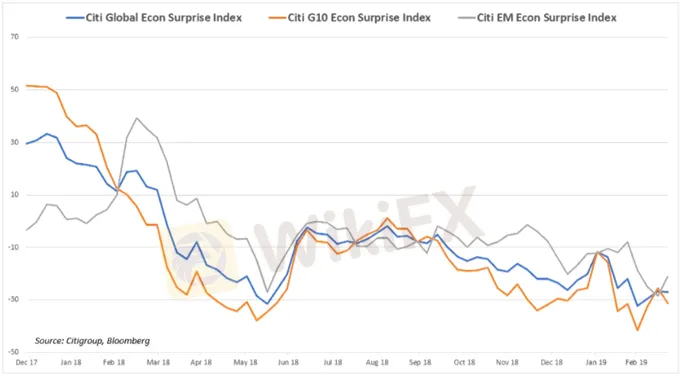简体中文
繁體中文
English
Pусский
日本語
ภาษาไทย
Tiếng Việt
Bahasa Indonesia
Español
हिन्दी
Filippiiniläinen
Français
Deutsch
Português
Türkçe
한국어
العربية
Pound Eyes Parliament-Led Brexit Efforts, Yen May Resume Rise
Abstract:British Pound volatility is likely as the UK Parliament tries to wrest away control of Brexit from the government. The Yen may rise amid renewed global slowdown fears.
TALKING POINTS – BRITISH POUND, BREXIT, YEN, SENTIMENT
British Pound volatility likely as Parliament takes charge of Brexit
Yen may rise as French, US data stokes global slowdown concerns
Tone of global economic news flow sets the stage for risk aversion
Political drama in Westminster may take canter stage in European trading hours after the UK House of Commons appeared to have wrestled control of the Brexit process from the government of Prime Minister Theresa May. A series of “indicative votes” meant to gauge MPs appetite for a variety of EU withdrawal configurations and perhaps even a second referendum are due Wednesday.
In the meantime, traders will no doubt monitor the flurry of lead-in activity with great interest. Gauging which options might have the most broad-based support as well as the likelihood that Ms May will respect the pollings outcome – either by implementing it or stepping aside – may drive seesaw British Pound volatility. Lasting directional follow-through seems unlikely for now however.
On the data front, a revised set of fourth-quarter French GDP figures as well as US housing and consumer confidence statistics. Disappointing outcomes echoing the recent trend toward underperformance relative to forecasts (see chart below) may feed global growth concerns and sour sentiment, boosting the anti-risk Japanese Yen while hurting the likes of the cycle-sensitive Australian Dollar.
What are we trading? See the DailyFX teams top trade ideas for 2019 and find out!
CHART OF THE DAY – GLOBAL ECONOMIC DATA FLOW WARNS OF WEAKNESS

Citigroup helpfully tracks the tendency of economic data outcomes across a variety of countries and groupings to deviate from baseline forecasts, either in the positive or negative direction. A macro view sizing up the overall global index as well as independent measures for the G10 and emerging market (EM) economies reveals that data flow as steadily deteriorated since mid-2018.
Broadly speaking, this suggests that realized economic outcomes have tended to be worse than analysts models anticipated for the better part of nine months. Against this backdrop, it seems hardly surprising that investors have turned skittish. If the downward revision of projections continues to lag the pace of deterioration in economic conditions, risk aversion is likely to remain the path of least resistance.
Disclaimer:
The views in this article only represent the author's personal views, and do not constitute investment advice on this platform. This platform does not guarantee the accuracy, completeness and timeliness of the information in the article, and will not be liable for any loss caused by the use of or reliance on the information in the article.
Read more

Global Market Volatility and Strategic Moves by Major Economies and Companies
Global markets face volatility with significant declines in US and Asian stocks due to central bank rate decisions and economic uncertainties. JPMorgan's recession forecast, and Cathie Wood's tech stock acquisitions. Additionally, geopolitical tensions, market shifts in New York and Thailand, and rising energy prices in Europe highlight the diverse factors influencing the global financial landscape.

Dovish Fed’s Statement Hammers Dollar
The highly anticipated Fed’s interest rate decision was disclosed yesterday, hammering the dollar’s strength lower as Fed Chief Jerome Powell explicitly signalled that a September rate cut is possible. The U.S. central bank is balancing both inflation and recession risks, with interest rates adjusted to curb inflation while maintaining a solid labour market.

<Part 2> GTSE Global Market Dynamics: Key Developments
Global markets face significant changes. China's financial sector caps salaries under Xi Jinping's "common prosperity" policy, affecting the yuan and major financial stocks. India's entry into the JPMorgan Emerging Markets Bond Index boosts investment and strengthens the rupee. Nike's weak outlook suggests a U.S. economic slowdown. Japan's yen nears a 40-year low, prompting potential stabilization efforts. Hong Kong faces judicial concerns, impacting its financial stability.

<Part 1> GTSE Global Market Dynamics: Key Developments
Global markets face significant changes. China's financial sector caps salaries under Xi Jinping's "common prosperity" policy, affecting the yuan and major financial stocks. India's entry into the JPMorgan Emerging Markets Bond Index boosts investment and strengthens the rupee. Nike's weak outlook suggests a U.S. economic slowdown. Japan's yen nears a 40-year low, prompting potential stabilization efforts. Hong Kong faces judicial concerns, impacting its financial stability.
WikiFX Broker
Latest News
PH SEC Issues Crypto Guidelines for Crypto-Asset Service Providers
FTX Chapter 11 Restructuring Plan Activated: $16 Billion to Be Distributed
Think Before You Click: Malaysian Loses RM240,000 to Investment Scam
Share Industry Insights and Discuss Forex Market Trends
Top 9 Financial Fraud Cases in Recent History
KuCoin Pay Introduces Easy Crypto Payments for Merchants
Malaysian Man Killed in Alleged Forex Dispute-Related Attack
How Big is the Impact of the USD-JPY Rate Gap on the Yen?
What Euro Investors Can't Afford to Miss
Is OneRoyal the Right Broker for You?
Currency Calculator






